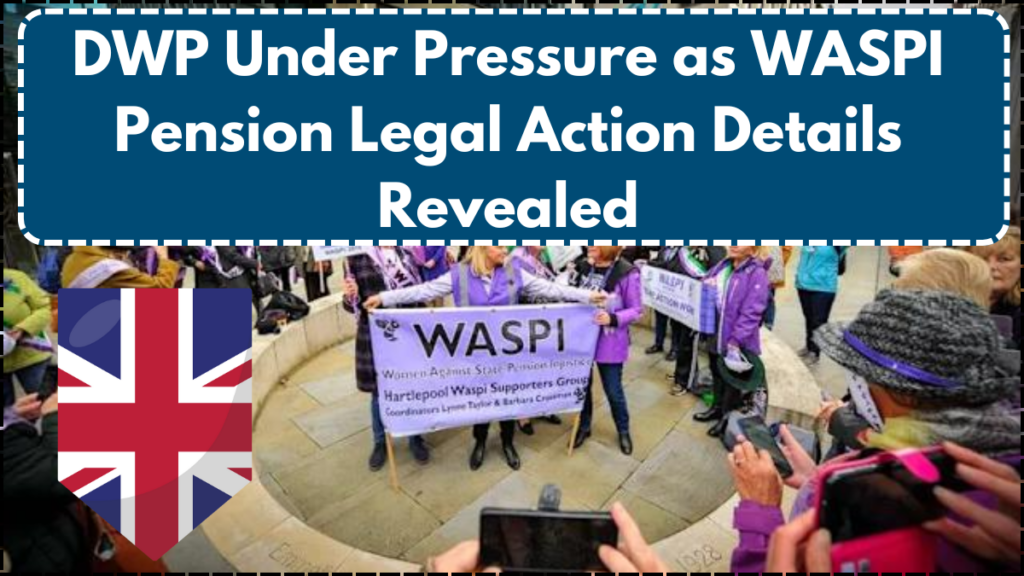The Department for Work and Pensions (DWP) is under growing scrutiny as the Women Against State Pension Inequality (WASPI) campaign intensifies its legal battle. On April 8, 2025, the group officially filed a judicial review, accusing the DWP of mishandling the state pension age changes that impacted millions of women born in the 1950s.
At the center of the controversy is the DWP’s failure to adequately inform women that their state pension age would rise from 60 to 66. This change, implemented without proper communication, left many with no time to financially prepare for a delayed retirement.

Legal Case Gains Traction with Financial and Legal Backing
WASPI’s legal challenge is supported by top-tier legal professionals from Bindmans LLP and Landmark Chambers, renowned for expertise in public law and human rights. The group’s crowdfunded campaign has already raised over £180,000, signaling widespread support and a strong desire for accountability.
The legal application focuses on two main arguments:
- Irrational Government Decisions: WASPI asserts that the government’s rejection of the Parliamentary and Health Service Ombudsman (PHSO)’s recommendation for compensation lacked rational basis.
- Dismissal Without Proper Grounds: The DWP’s claim that most women were aware of their pension age change and therefore did not suffer injustice is challenged as illogical and unfounded.
Table: Timeline of WASPI Pension Justice Campaign
| Date | Event |
|---|---|
| Early 1990s | State pension age reforms announced |
| 2011 | Pension age raised to 66 begins to affect 1950s-born women |
| 2015 | WASPI campaign formally launched |
| March 2024 | PHSO final report recommends Level 4 compensation |
| April 8, 2025 | WASPI files judicial review against DWP |
The PHSO Report and Government Pushback
The PHSO concluded that the DWP committed maladministration by failing to communicate critical changes to those affected. Despite this, the government rejected the findings and proposed compensation between £1,000 and £2,950 per woman—a sum many MPs and campaigners deemed insultingly low.
In dismissing the report, the DWP argued that written notices alone were insufficient to ensure public awareness. However, critics point out that the DWP failed to adopt alternative strategies to reach vulnerable groups, especially those without digital access or regular government correspondence.
Campaigners Call for Fair Compensation
The judicial review seeks a declaration that the government’s rejection of compensation was irrational and lacked credible justification. It also asks the High Court to annul the DWP’s decision and award legal costs to the claimants.
Meanwhile, time is running out for many of the affected women. According to WASPI estimates, one woman in the campaign cohort dies every 13 minutes. The emotional toll is mounting as justice continues to be delayed.
Political and Public Pressure Mounting
Members of Parliament, including Labour MP Rebecca Long-Bailey, have called the DWP’s actions an act of “institutional cruelty.” She and others insist the government must do more than offer apologies—it must deliver compensation and restore trust.
WASPI representatives have stressed that this fight is about fairness, accountability, and recognition of the immense personal and financial losses these women have endured. They remain firm: the movement will not back down.
Conclusion
As of April 2025, the battle between WASPI and the DWP continues to escalate. With legal proceedings underway and public support growing, the government faces increasing pressure to acknowledge its failures and compensate those affected. For the thousands of women affected by this long-standing injustice, the demand is simple: fairness, now.
FAQs
What is WASPI?
WASPI stands for Women Against State Pension Inequality. It is a campaign group representing women born in the 1950s who were affected by uncommunicated changes to the state pension age.
What is the WASPI legal case about?
The case challenges the DWP’s failure to notify women about pension age increases and disputes the government’s rejection of compensation recommendations by the PHSO.
Why is the pension age increase controversial?
While increasing the pension age isn’t the core issue, the controversy lies in how poorly the change was communicated. Many women only discovered the change close to retirement, disrupting their financial planning.
What kind of compensation is WASPI seeking?
WASPI argues that the recommended compensation of £1,000-£2,950 is insufficient. They are calling for payments that reflect the severe economic and emotional impact on affected women.
How can the public support the WASPI campaign?
Supporters can donate to the legal crowdfund, write to their MPs, or spread awareness on social media to keep pressure on the government.
For More Information Click Here
Pari is a passionate writer known for captivating stories that blend imagination and reality. Inspired by travel, history, and everyday moments, Pari crafts narratives that resonate deeply with readers.




